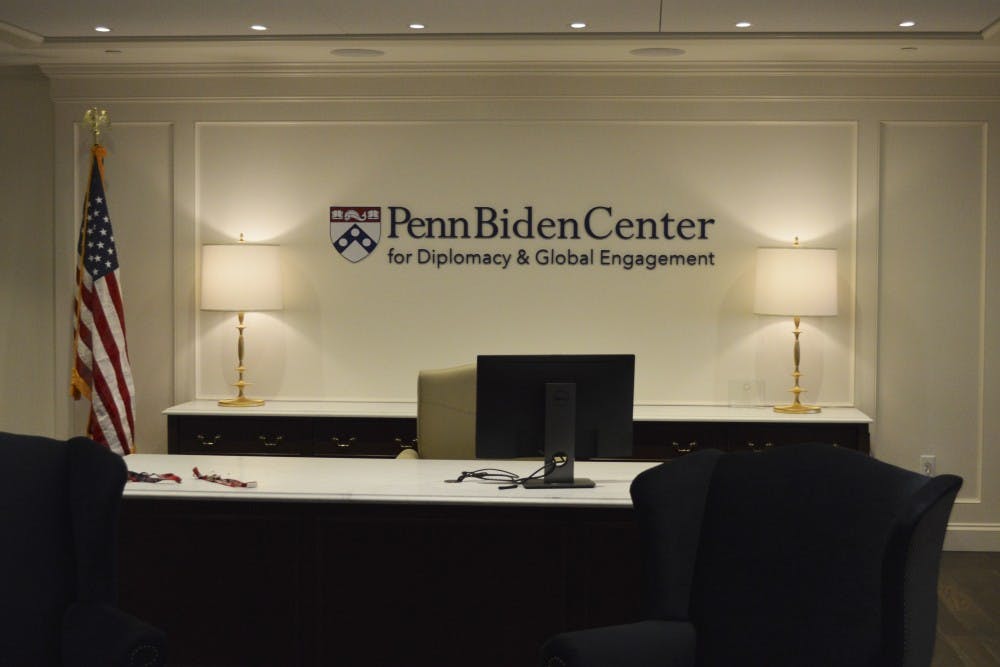The state of American democracy was the central question of a focus group last week that invited Penn undergraduate students to share their perspectives as an indication of how the younger generation views the current political climate and which demographics have the most faith in the current system.
On Oct. 16, the Democracy Project gathered focus groups of 25 Penn students to discuss the central question, "Can democracy survive and prosper in the current political climate?"
The Democracy Project is an initiative of the Penn Biden Center for Diplomacy and Global Engagement, Freedom House, and the George W. Bush Institute, aimed at rebuilding strong bipartisan support of democracy at home and abroad. The project recently released a report about Americans' belief in democracy, finding that most Americans think democracy is important but that it is weakening.
The focus group touched on these findings and the issues explored in the report, including the current state of democracy, levels of frustration with racism and discrimination, the role of democracy and human rights in United States foreign policy, and steps that could be taken to strengthen the current system and eliminate inequality, as well as the depolarization of political parties and schools of thought.
The focus group is the first of four taking place at several universities. Questions ranged from asking about students’ opinions about democratic principles to possible solutions for resolving controversial partisan issues. The students broke into smaller discussion groups led by moderators.
One question asked by moderators involved whether or not students felt a different political system would function better than democracy, and whether or not it should matter to the U.S. if other countries choose to adopt democratic principles.

Professor Jeffrey Green, director of the Andrea Mitchell Center for the Study of Democracy at Penn, described the focus group as an opportunity to answer “the question of specificity” about how race and socioeconomic status influence people's political opinions. He defines the goal of the project as an identification of “the areas of democracy that are robust … and those in which people are losing faith.”
RELATED:
New Penn prof Jeb Bush discusses 'tribal tendencies' of partisan politics at College Hall
At Penn Law event, Swiss President Alain Berset discusses fake news, voter participation
Most importantly, he said, the focus group gave individuals the opportunity to observe generational differences in democratic beliefs, and how those beliefs have changed over time, especially given recent changes in political climate.
College sophomore Talia Rosenberg described her experience in the focus group as enjoyable and eye-opening. Rosenberg said her key takeaway from the focus group was that “people are able to identify the problems with our democratic system, but not always how they are a part of them.”
She also discussed the fact that partisanship was a major theme in many of the discussion questions, and found the group came to the consensus that partisanship is one of the biggest problems in our democracy.
“Most students don’t take steps to fix the ‘echo chambers,’ and so many people never try to seek out opinions from the other side,” she said.
College junior Michael Greenstein agreed, saying that the students as a whole came to the consensus that in order to make the democratic system function successfully, students need to “reach across the aisle.”
Greenstein also cited one of the more controversial discussions as involving the topic of democracy promotion abroad. He found it interesting that many of the participants “correlated [participation in] democracy with military intervention.”

Ariana Berengaut, director of Programs, Partnerships, and Strategic Planning at Penn Biden Center, found that the true value of the focus group came from the bipartisan nature of the discussion, and the fact that it wasn’t necessarily political from the outset.
“I believe that young people appreciate and understand the pillars of democracy and the freedoms the democratic system guarantees to us — the only concern is about how that democracy is being expressed today,” Berengaut said.
She said she believed the focus group allowed students to analyze and discuss more fundamental questions about democracy, which can otherwise be difficult in the current environment.
Ultimately, the solutions put forth by the Democracy Project report include a “call to action,” as well as an emphasis on the importance of civic education and the publication of success stories.
“If we don’t like the system, we have a responsibility to change it," Greenstein said. "This is one of the tasks of our generation.”









